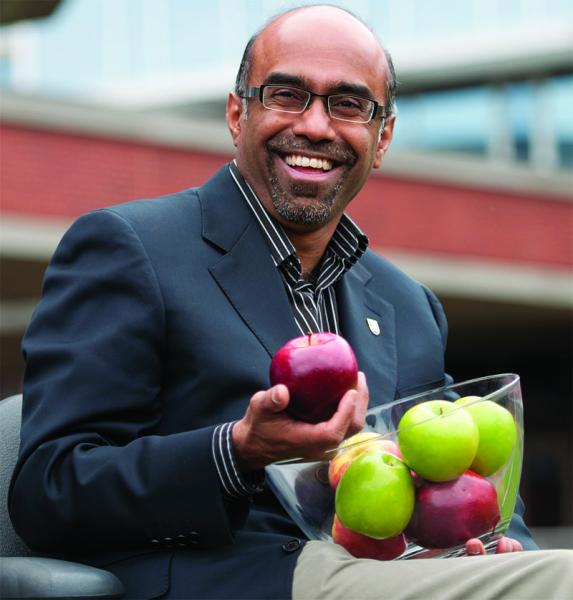A. R. Elangovan appointed Distinguished Professor
Peter B. Gustavson School of Business
- Moira Dann

The latest University of Victoria Distinguished Professor is Dr. A. R. (Elango) Elangovan of the Gustavson School of Business. This distinction is the highest academic honour UVic can bestow on a faculty member; only 12 faculty members have been honoured since the creation of the designation in 2002.
Dr. Elangovan was also recognized with a 3M National Teaching Fellowship last year, an award that honours exceptional contributions made by teacher-scholars from all across the country.
These honours make it difficult to believe that Dr. Elangovan grew up wanting to be . . . a pilot.
“I never considered a university/teaching career until I started my PhD program,” says Elango. “Even then, I saw it more broadly as an academic career with only vague notions of what that entailed. When I completed my PhD at the University of Toronto, the focus was primarily on research rather than teaching. So I was pleasantly surprised when I started at the University of Victoria that I enjoyed teaching.”
The split focus of research and teaching is a challenge in any academic career, a challenge made even more complex with the addition of administrative responsibilities and university service obligations. For Elango, it “translates into a work-life balance issue.”
He says he’s balanced the teaching and research demands of his career “with a lot of difficulty and with mixed success.” But, he adds, there are two factors that cast this whole matter in a different light.
“First, I don't see what I do as ‘work’–it blends and flows so seamlessly through my life and all that it entails. Second, I spend a bit of reflective time every day to stay grounded and to get some perspective on my priorities.”
It also helps that Elango finds both life streams–research and teaching–so rewarding. “From a research perspective, it is very rewarding to see the research you do have a real impact on managerial and organizational practice,” he says delightedly. He cites his research on third-party intervention in disputes (which has been used for training prison guards by Corrections Canada), and his research on callings (which gets people to reflect on the work they do and the meaning they attach to it). “It is fulfilling to see the positive impact you can contribute to by helping people address a key issue/problem that they have.”
There’s a similar payoff with teaching, says Elango. “The short-term reward is seeing students catch on to a different way of thinking about organizational and managerial issues that helps them make better sense of the organizational/business world around them. The long-term reward is in hearing them say how they use what they learned during my course/the program in their daily work and how it is helping them move forward and get closer to their goals and dreams.”
Elango’s teaching philosophy is simple: “The focus is on the students, not us,” he says.
“It should be about their learning rather than my teaching. To me this is a key difference–we need to approach education [asking] ‘What is that we need to do so that they learn best’ (and every student is different) rather than ‘How can I teach best?”
While Elango may have traded his teenage dreams of becoming a pilot for a university career, he has dreams of another kind of flight for his students.
He hopes that “rather than being first class (or business class!) passengers in a flight piloted by their professors, they become co-pilots in charting their own journeys and destinations.”

